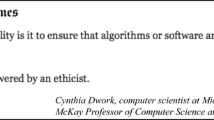Abstract
In this paper I present a moral account of the legal notion of deceptive advertising. I argue that no harmful consequences to the consumer need follow from a deceptive advertisement as such, and I suggest instead that one should focus on the consequences of permitting the practise of deceptive advertising on society as a whole. After a brief account of ‘deceptive advertising’, I move to discuss the role of the reasonable person standard in its definition. One interpretation of this standard is empirical, aiming to objectify the quality of misleadingness in the advertisement. I offer an alternative normative interpretation which aims to draw the line between the advertiser's responsibility and that of the consumer, between misleading and miscomprehension. I then examine and reject several possible moral grounds for condemning and prohibiting deceptive advertising. These include: harm, in the sense of welfare, to the misled consumer; harm to competitors; and a violation or a reduction of the consumer's autonomy. Finally, I explain how the effect of the practise of deceptive advertising on society as a whole should inform our normative line-drawing between misleading and miscomprehension, and how it provides the basis for the moral evaluation of deceptive advertising.
Similar content being viewed by others
References
Akerlof, G. A.: 1984, ‘The Market for “Lemons”: Quality Uncertainty and the Market Mechanism’, in An Economic Theorist's Book of Tales (Cambridge University Press, Cambridge). Originally published in The Quarterly Journal of Economics 84 (1970), pp. 488–500.
Beauchamp T. L.: 1984, ‘Manipulative Advertising’, Business & Professional Ethics Journal 3, 1–22.
Brenkert, G. G.: 1984, ‘Commentary on “Children as Consumers”’, Business & Professional Ethics Journal 3, 147–153.
Carson, T. L., R. E. Wokutch and J. E. Cox Jr.: 1985, ‘An Ethical Analysis of Deception in Advertising’, Journal of Business Ethics 4, 93–104.
Christman, J.: 1988, ‘Constructing the Inner Citadel: Recent Work on the Concept of Autonomy’, Ethics 99, 109–124.
Ford, G. T. and J. E. Calfee: 1986, ‘Recent Developments in FTC Policy on Deception’, Journal of Marketing 50, 82–103.
Gardner, D. M.: 1975, ‘Deception in Advertising: A Conceptual Approach’, Journal of Marketing 39, 40–46.
Hill, T. E.: 1991, ‘Autonomy and Benevolent Lies’, in Autonomy and Self-Respect (Cambridge University Press, Cambridge).
Jackson, J.: 1990, ‘Honesty in Marketing’, Journal of Applied Philosophy 7, 51–60.
Jacoby, J. and C. Small: 1975, ‘The FDA Approach to Defining Misleading Advertising’, Journal of Marketing 39, 65–73.
Jacoby, J. and W. D. Hoyer, 1982, ‘Viewer Miscomprehension of Televised Communication: Selected Findings’, Journal of Marketing 46, 12–26.
Jacoby, J. and G. J. Szybillo: 1995, ‘Consumer Research in FTC Versus Kraft (1991): A Case of Heads We Win, Tails You Lose?’, Journal of Public Policy and Marketing 14, 1–14.
Paine, L. S.: 1984, ‘Children as Consumers: An Ethical Evaluation of Children's Advertising’, Business & Professional Ethics Journal 3, 119–146.
Wyckham, R. G., P. M. Banting and A. K. P. Wensley: 1984, ‘The Language of Advertising: Who Controls Quality?’, Journal of Business Ethics 3, 47–53.
Author information
Authors and Affiliations
Rights and permissions
About this article
Cite this article
Attas, D. What's Wrong with "Deceptive" Advertising?. Journal of Business Ethics 21, 49–59 (1999). https://doi.org/10.1023/A:1005985723779
Issue Date:
DOI: https://doi.org/10.1023/A:1005985723779




